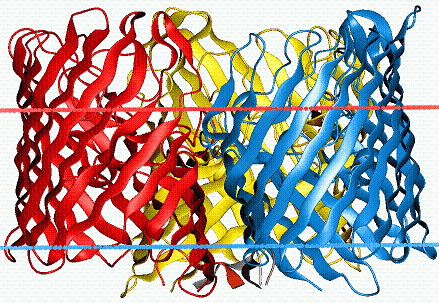Porin
 From Conservapedia
From Conservapedia Porins[1][2] are proteins which cross a cellular membrane and act as a pore through which molecules can diffuse. Unlike other membrane transport proteins, porins are large enough to allow passive diffusion - i.e. they act as channels which are specific to different types of molecules.
The nonpolar interior of membranes limits the free diffusion of polar molecules. In most membranes various proteins serve as channels and pumps which regulate the movement of ions, metabolites and even water across the membrane. Due to the specificity of these proteins there is a high degree of control over what passes through the membrane. Several membranes such as the outer membranes of mitochondria, chloroplasts and bacteria, however, do not need the same high degree of control over what gets across. Rather than synthesizing many selective proteins to carry polar molecules across, it appears that cells make only a few types of transporters, like the porin, which let almost anything below a certain size across. It may simply be more cost effective to put a few porins in these membranes then many more selective proteins. These "leaky" membranes are still effective barriers to the movement of large molecules such as proteins.
References[edit]
Categories: [Cellular Biology] [Molecular Biology]
↧ Download as ZWI file | Last modified: 02/16/2023 14:32:47 | 47 views
☰ Source: https://www.conservapedia.com/Porin | License: CC BY-SA 3.0
 ZWI signed:
ZWI signed:
 KSF
KSF